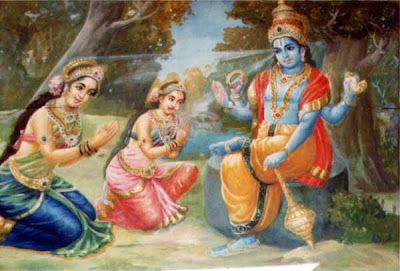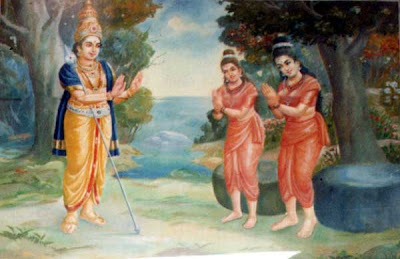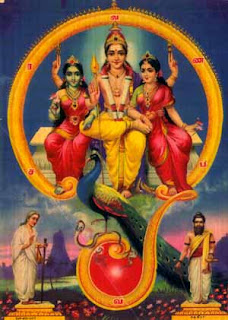Ten Daityas of fierce exploits came there, each accom¬
panied by a crore of followers. There were many others too
(ready) for war. Their leader was Jambha.
Fight with Vishnu
Fight with Indra
66-68. When the elephant fell down, there was a great leonine roar everywhere among the armies of Suras. It became intense by the trumpeting sound of the elephants, neighing sound of the horses and the sounds of slapping of the hands by the archers in the army. On seeing the elephant killed and Nirai turned away (from the battlefield), and also on hearing the leonine roar of Suras reverberating in the cardinal points, Jambha, blazed with anger like a fire that is enkindled.
69. Thereafter, with his eyes turned red with anger and fixing an arrow to the bow, he said in a shrill voice, “Stop, stand.” He also encouraged his charioteer.
70. On seeing him coming with the arrow fixed to the bow, Satakratu who never got frightened, grasped his bow tightly.
71-74. He took up an arrow with a crescent-moon-like tip, cleaned with oil and capable of flying in a straight line. With that, the slayer of Bala and Yrtra, cut off his bow along with the arrows. After casting aside that bow which had been broken, Jambha, the delighter of Danavas, took up another heavy bow and with it he discharged oil-cleaned, straight-flying arrows which had the shape of a serpent. He pierced Sakra in the region of the collar bone with ten arrows, in the region of the heart with three arrows and in the shoulders with two arrows.
75-78a. Sakra discharged a volley of arrows towards the great Danava. Even before the arrows discharged by the arm of Sakra reached him, while they were in the sky itself, the great Danava cut them into a hundred pieces by means of arrows com¬ parable to flames of fire. Thereupon, Devendra covered the Lord of Danavas carefully by means of a volley of arrows, like the sky with clouds during the rainy season. The Daitya too pierced (Sakra) by means of sharp arrows, just as the Wind scatters away the cluster of clouds which could not be stopped at the cardinal points.
78b-81. When Sakra could not excel the great Danava on account of his fury and agitation, he discharged an extremely miraculous Gandharva missile. Thereupon, the whole of the sky was pervaded by its refulgence. (It created) Gandharva cities of miraculously wonderful shapes having different kinds of ram¬ parts and arched gateways, discharging showers of arrows all round. The great array of Daityas which was being killed by that shower of arrows sought refuge in Jambha saying “Save us, save us”, O descendant of Bharata.
82. Then Jambha of great virility, roared and laughed frequently. Remembering the good behaviour of good people, he assured them freedom from fear.
83. Then he discharged a very excessively frightful missile named Mausala. Thereupon, the entire universe became filled with terrible threshing rods.
84-85. All the Gandharva cities were shattered by them. Then with a single fierce blow, he smashed to smithereens the Sura, his chariot, horse and elephant. They fell into hundreds and thousands of pieces. Thereafter the lord of Suras, Jsakra, discharged a Tvasfra missile.
86 . When that missile was being fixed (to the bow), sparks of fire came out. Then thousands of mechanical arts and lores(?) manifested themselves. 87. (Now) the fight (was carried on) by those machines (in the sky). The firmament became devoid of stars- The MauSala missile was broken by those machines. Asuras were killed then.
88 . Jambha then released a Saila missile that could reduce the collection of machines to powder. Thereupon showers of stones of the Vyama (i.e. the measure equal to the distance bet¬ ween the tips of fingers when the arms are stretched on either side) length began.
89. Whatever machines had been made by the Tvasfra missile, O descendant of Bharata, were reduced to very small pieces like gingelly seeds, on account of the fall of those stones.
90. Falling with great speed, those stones then fell with great force and hitting the heads of Devas, tore up the ground and the army consisting of the four units.
91. Thereupon, the thousand-eyed Purandara despatched the Vajra missile whereat the great shower of stones and rocky slabs was shattered all round.
92. With the Saila missile subdued, Jambha who resembled a mountain (in steadiness) despatched an Aisika missile. He (thus) smashed the valour of the enemy.
93-95. When the great missile Aisika, the extremely terrible missile, prevailed, the armies of Devas were burned along with the chariots and elephants. The Vajra missile that had split even mountains was destroyed by the Aisika missile. While the armies were being burned all round by the refulgence of the missile, the Slayer of Bala, the Chastiser of Paka. despatched an Agneya (‘of Fire-god’) missile. On account of this missile, the Aisika missile was destroyed.
96. When that missile was repelled, the Pavaka (i.e. Agneya) missile gained the upper hand. The army of Jambha, his chariots and the charioteer were burned.
97. When his missile had been repulsed the great Daitya who had presence of mind and brightness of conception dischar¬ ged a Vdruna (i.e. presided over by Varuna, the god of rain) missile that could subdue the flames of fire.
98. Thereupon, the sky was filled with clouds shining with lightning streaks. The earth was covered with, hailstones as big as elephants.
99-101. The universe was filled with torrents (of rain) equal in size to the trunks of elephants. On seeing the Agneya missile subdued and repulsed, Indra despatched a matchless Vayavya (i.e. presided over by the Wind- god) missile. Thereby the clouds were dispelled. As the cluster of clouds was dispelled by the power of the Vayavya missile, the sky became devoid of turbidness. It assum¬ ed the lustre of the petals of the blue lotus. On account of the excessively (violent) gust of wind, all Danavas began to shiver.
102-103. Even those who were the most powerful among them could not stand there in the battle(field). Thereupon, Jambha became a mountain extending to ten Yojanas for the curbing of the violent wind. The Commander of the army of Danavas (in the form of a mountain) was covered with various kinds of trees and creepers and endowed with different kinds of miraculous features.
104. When the violent gusts of wind subsided with the great Daitya’s assumption of the form of a mountain, Satakratu dis¬ charged the great Asani (i.e. thunderbolt) of adamantive features.
105. When that Asani fell upon it, the caves and the streams all round upon the Daitya in the form of a mountain became shattered and scattered.
106-107. Thereupon the magical power of transforming into a mountain, of the great Danava receded. With the deceptive power of transforming into a mountain thus repulsed, the exces¬ sively proud Lord of Danavas transformed himself into a terrible elephant of the huge size of a mountain. He trampled and crus¬ hed the army of Devas. With his tusks he killed Suras.
108-110. The Danava seized some with his trunk and thrashed them on his back. While he was destroying the armies of Suras, the slayer of Vrtra (Indra) discharged a Narasimha missile that was unassailable. Thereupon, thousands of lions came out, thanks to the power of the Mantra. They had claws resembling a saw. Out of delight they made loud sounds of bois¬ terous laughter and displayed their curved teeth. When the body (of the Danava) was split and torn by them, he gave up the deceptive Maya of being an elephant.
111. Thereupon he became a terrible serpent with a number of hoods. The great warriors in the army of Suras were burned by his poisonous breath.
112. Striking (enemies) in the course of the battle, Sakra discharged a Garuda missile. Thereupon thousands of Garudas emerged from it.
113. Those Garudas came upon Jambha who had assumed the form of a serpent. The Daitya was split into pieces and his Maya (‘magical power of deception’) was destroyed.
114. When his Maya was frustrated, Jambha, the great Asura, assumed a matchless form reaching up to the region of the Moon and the Sun.
115-117. Rolling his eyes, he wished to swallow the leading Suras. The army of Suras along with the elephants and the great warriors entered his mouth that was terrible and of which the palate was very formidable descending up to Patala. When the armies were being swallowed by the powerful Danava, Sakra became dejected and distressed, driving his vehicle (i.e. Airavata) who had already become tired. He did not know what to do then. He spoke thus to Janardana:
118-120. “Command what it is that has to be particular y done by us subsequently (in this situation). We shall do that unto this Danava who is desirous of fighting.” Thereupon the liberal-minded Hari spoke this to the Lord with the thunderbolt for his weapon (i.e. Indra): “O cowardly one afraid of the enemies, the battle should not be abandoned now (though) it is terrible. Do not go. Do not be confused and deluded. O Lord, remember quickly the missile pertaining to Narayana with great purity of mind.” On hearing it he discharged it (i.e. the Narayanastra ).
121. In the meantime the Daitya with his open mouth had swallowed within a short while three hundred thousands each of the Kinnaras, Serpents, and Raksasas. 122. Thereupon, the Narayana missile struck his chest. With his heart pierced by the great missile, he shed much blood. 123. Thereupon, along with his refulgence the form of that Daitya too was destroyed. Thereat, the Daitya vanished after making a laughter of a loud report.
124-128. Stationed in the firmament in an invisible form that leading Daitya discharged Saslrasani (‘weapon of thunder¬ bolt’) that was a great destroyer of the armies of Suras. Similarly the Danava showered axes, discuses, adamantine arrows, mallets, lances, swords, javelins (having iron-tipped ends), Gudas (elephant armours) etc. out of anger. They were indestructible as well as inexhaustible. The ground was filled with those terrible missiles discharged by the Danava on the 'armies of Devas. It was also filled with arms, heads with ear¬ rings, thighs resembling the trunks of elephants, lordly elephants comparable to mountains, chariots with their shafts, poles, rods, wheels and axles broken and the charioteers as well. The earth became impassable as flesh and blood formed a massive bog.
129. The great army of Suras flowed like a stream where blood constituted eddies and whirlpools, the huge bodies of elephants formed rocky boulders and (wherein) headless trunks danced.
130-138a. It caused great delight to jackals, vultures and crows. After drinking the blood the flesh dripping blood was scattered (here and there) by Pisaca species (ghosts). They were dancing along with their wives who had no (undue) excite¬ ment. A certain haughty wife was infuriated when the Pisaca coUected the hoofs of the horses along with the pearls found within the frontal globes of elephants. Some of them rejoice in their ear-rings. Others look at it with anger. Gre“t experts n the matter of ornaments) of tie ears pacify Lm in mauy ways Some say ;‘0 De™, O Daityas, we pray to you, you Zt Z like this till the end of the Kalpa for the sake some (Tilacas) began to lick the sides of their mouths. Some said, “From this (frothy) water we know whether the e ow is wicked or good.” Some who had inclinations towards religion performed the Tarpana rites (libations etc.) to the Pitrs •and the Devas^ by means of the auspicious blood and flesh on the banks of the river of blood. Some ofthem were seated on heaps of flesh, but seeing a piece of flesh in the hand of another, they began to shout loudly, Give me, give me” in the same manner as miserly rich men.
138b-142a. Some of them were satiated themselves but when they saw others eating they angrily bit their lips and look¬ ed at them with extreme malice and jealousy. Some furiously struck their bellies and censured them because they wished for everything edible, like persons who are themselves satisfied (yet) wish for other’s wealth. Some said, “Only today has the crea¬ tion of Brahma become praiseworthy. Previously the good dawn and the excellent stars were futile”. Thus here and there, in the midst of various gossips and dialogues of the meat-eating Pisacas in the course of the battle, Jambha who was invisible reduced Devas to powder by means •of his weapons.
142b-143. Then &akra, Dhanesa, Varuija, Pavana (the Wind-god), Anala (the Fire 7 god), Yama and Nirfti, all of great power, collectively discharged divine missiles in the sky aiming at the Danava.
144. The missiles of the Devas discharged towards the Danava became futile like the hundred actions of excessively >cruel-minded people done to harm a noble-minded person.
145-146. The tired Daityas and the Devas did not know where he had gone. (Devas) had all their limbs pierced and split by the missile of the Daitya. Like cows oppressed by chillness they got merged into one another expressing “Alas! what will be the.future?” On seeing that situation Hari spoke to Indra and the Devas:
147. “O king of Devas, remember the Aghora Mantra. The missile thereof has the power and potentiality of the Pasupata. It had been granted to you by Rudra who was delighted. It has never been repulsed and it hits and strikes excellent heroes.”
148-150a. On being enlightened and urged by Hari thus, Sakra bowed down to the Bull-emblemed Lord Siva. He then took up the arrow with crescent-shaped tip which is well-honour¬ ed in divine battle and was destructive of enemies. The intelli¬ gent (Lord Indra) fixed it to his invincible bow and charged it with Aghora Mantra. He then' drew the bowstring as far as his ear (along with the arrow) whose rays were infallible and releas¬ ed it quickly for slaying him.
150b-153. On seeing the great missile coming on, the Asura shed his Maya suddenly. His face began to tremble. His body became stiff. He became excited. Then the arrow with crescent¬ like tip charged with the Mantra of the excellent missile and suddenly discharged from the bow of Purandara in the course of the great battle, emulated the mid-day Sun by means of its (dazzling) body. It caused the head of Jambha to fall down along with the ear-rings—the head that had the lustre of a prominently projecting crown, that had been rendered fragrant by many sweet smelling flowers and the hair on which had the lustre of the fire that diffuses smoke all round.
154. When Jambha was killed by Indra Suras praised him much. Lord Vasudevatoo said, “Well-done! Well-done!”
155. On seeing Jambha slain, the leading Danavas turned their faces back with their hopes and ambitions shattered; all of them fled to Taraka.
Source








